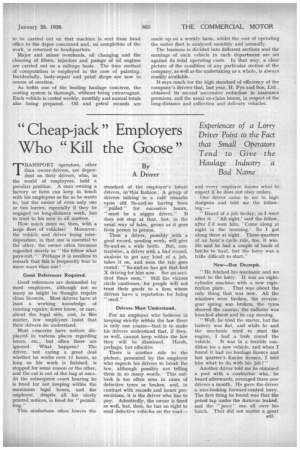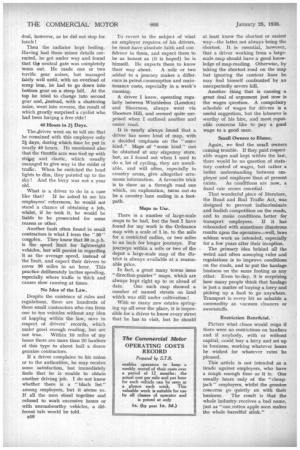" Cheap-jack " Employers Who "Kill the Goose"
Page 19

Page 20

If you've noticed an error in this article please click here to report it so we can fix it.
By A Driver
ITRANSPORT operators, other than owner-drivers, are dependent on their drivers, who, in the world of employees, hold a peculiar position. A man owning a factory or farm can keep in touch with his employees so far as he wants to, but the owner of even only one or two lorries, especially if they be engaged on long-distance work, has to trust to his men in all matters.
How much more SO, then, with a large fleet of vehicles? Moreover, the vehicle and driver being interdependent, in that one is essential to the other, the owner often becomes regarded merely as " the fellow what pays out." Perhaps it is needless to remark that this is frequently true in more ways than one !
Good References Required.
Good references are demanded by most employers, although not so many as might be thought require clean licences. Most drivers have at least a working knowledge of running repairs; fewer know, or care, about the legal side, and, in this matter, few employers insist that their drivers do understand.
Most concerns have notices displayed in various places regarding hours, etc., but often these are ignored. What happens? The driver, not caring a great deal whether he works over 11 hours, as long as his work is finished, is stopped for some reason or the other, and the cat is out of the bag at once. At the subsequent court hearing he is fined for not keeping within the maximum legal hours, and the employer, despite all his nicely printed notices, is fined for " permitting."
This misfortune often lowers the
standard of the employer's future drivers, in this fashion : A group of drivers talking in a cafe remarks upon old. So-and-so having been " pulled " for excessive hours, " must be a nigger driver." It does not stop at that, but, in the usual way, of tales, grows asit goes from person to person.
Then a driver, possibly, with a good record, needing work, will give So-and-so a wide berth. But, contrariwise, a driver with a bad record, anxious to get any kind of a job, takes it on, and soon the tale goes round : "So-and-so has got that fool X driving for him now. See an accident there soon." Still the vicious circle continues, for people will not trust their goods to a firm whose drivers have a reputation for being "mad."
Drivers Must Understand.
For an employer who believes in keeping strictly within the law there is only one course—that is to make his drivers understand that, if they, as well, cannot keep within the law they will be dismissed. Harsh, perhaps, but effective.
There is another side to the picture, presented by the employer who expects his drivers to break the law, although possibly not telling them in so many words. This outlook is too often seen in cases of defective tyres or brakes, and, in contrast with records and hours prosecutions, it is the driver who has to pay. Admittedly, the owner is fined as well, but, then, he has no right to send defective vehicles on the road—
and every employee knows what to expect if he does not obey orders.
One driver 'came to me in high dudgeon and told me the following
Heard of a job to-day, so I went after it. ' All right,' said the fellow, after I'd seen him, 'Come along at eight in the morning.' So I got along there at eight. Three-quarters of an hour's cycle ride, too, it was. He said he had a couple of loads of bricks to haul, but the lorry was a trifle difficult to start."
New—But Decrepit.
"He fetched his mechanic and we went to the lorry. It was an eightcylinder machine with a new registration plate. That was about the only thing that was new. All the windows were broken, the reversegear spring was broken, the tyres showed the canvas, the radiator was knocked about and its cap missing.
"Well, he tried the starter, but the battery was flat, and while he and the mechanic tried to start the engine, I had a look round the
vehicle. It was in a terrible condition for a new vehicle, and when I found it had no haulage licence and last quarter's Excise licence, I told him what to do. with his job l"
.Another driver told me he obtained a post with a contractor who, he heard afterwards, averaged three new drivers a month. He gave the driver a nice-looking forward-control lorry. The first thing he found was that the petrol tap under the Autovac leaked, and the "juice" ran all over his lunch. That did not matter a great deal, however, as he did not stop for lunch!
Then the radiator kept boiling. Having had these minor details corrected, he got under way and found that tha neutral gate was completely worn out. He made one or two terrific gear noises, but managed fairly well until, with an overload of scrap iron, he had to go down into bottom gear on a steep hill. At the top he tried to change into second gear and, ,instead, with a shattering noise, went into reverse, the result of which greatly surprised a cyclist who had been having a free ride I 40 Hours in 21 Days.
The-driver went on to tell me that he remained with this employer only 21t days, during which time he put in nearly 40 hours. He mentioned also that the throttle arm was tied up with str4pg and elastic, which usually managed to give way in the midst of traffic. When he switched the head lights to dim, they pointed up to the sky ! And the lorry was not a year old.
What is a driver to do in a case like that? If he asked to see his employers' references, he would not stand a chance of obtaining a job, whilst, if he took it, he would be liable to be prosecuted for some reason or other.
Another fault often found in small contractors is what I term the " 30 " coniplex. They know that 30 m.p.h. is the speed limit for lightweight vehicles, but will persist in regarding it as the average speed, instead of the limit, and expect their drivers to cover 30 miles in an hour. This practice deliberately incites speeding, especially where traffic is thick and causes slow running at times.
No Idea of the Law.
Despite the existence of rules and regulations, there are hundreds of these small contractors who run from one to ten vehicles without any idea of kepping within the law, save in respect of drivers' records, which make good enough reading, but are not true. Within 10 miles of my home there are more than 20 hauliers of this type to about half a dozen genuine contractors.
If a driver complains to his union or to the authorities, he may receive some satisfaction, but immediately finds that he is unable to obtain another driving job. I do not know whether there is a "black list" among employers, but it seems so. If all the men stood together and refused to work excessive hours or with unroadworthy vehicles, a different tale would be told.
alO To revert to the subject of what an employer requires of his drivers, he must have absolute faith and confidence in them, and expect them to be as honest as (it is hoped) he is himself. He expects them to know their way about. A mile or two added to a journey makes a difference in petrol consumption and maintenance costs, especially in a week's running.
A driver I knew, operating regularly between Wimbledon (London) and Sheerness, always went via Shooters Hill, and seemed quite surprised when I outlined another and easier road.
It is nearly always found that a driver has some kind of map, with a decided emphasis on the "some kind." Maps of "some kind" can be obtained at any sixpenny store, but, as I found out when I used to do a lot of cycling, they are unreliable, and will often, especially in country areas, give altogether erroneous information. A favourite trick is to show as a through road one which, on exploration, turns out =to be a country lane ending in a footpath.
Maps to Use.
There is a number of large-scale maps to be had, but the best I have found for my work is the Ordnance map with a scale of 1 in. to the mile for a restricted radius, or two miles to an inch for longer journeys. For journeys within a mile or two of the depot a large-scale map of the district is always available at a reasonable price.
In fact, a great many towns issue " direction-pointer" maps, which are always kept right up to or ahead of date. One such map showed a number of named streets on land which was still under cultivation !
With so many new estates springing up all over the place, it is impossible for a driver to know every street that he has to visit, but he should at least know the shortest or easiest • way—the latter, not always being the shortest. It is essential, however, that a driver working from a largescale map should have a good knowledge of map-reading. Otherwise, by taking the shortest road on the map but ignoring the contour lines he may find himself confronted by an unexpectedly severe hill.
Another thing that is causing -a great deal of argument just now is the wages question. A compulsory schedule of wages for drivers is a useful suggestion, but the labourer is worthy of his hire, and most reputable concerns like to pay a good wage to a good man.
Small Owners to Blame.
Again, we find the small owners causing trouble. If they paid respectable wages and kept within the law, there would be no question of statutory control of wages, but rather a better understanding between employer and employee Than at present exists. As conditions are now, a fixed rate seems essential.
That wonderful piece of literature, the Road and Rail Traffic Act, was designed to prevent indiscriminate and foolish competition on the roads, and to make conditions better for transport employees. If it has rebounded with sometimes disastrous results upon the operators—well, laws seldom work as intended, especially for a few years after their inception. The primary idea behind all the weird and often annoying rules and regulations is to improve conditions on the roads, and to put the haulage business on the same footing as any other. Even to-day, it is surprising how many people think that haulage is just a matter of buying a lorry and picking up a load to go anywhere. Transport is every bit as saleable a commodity as vacuum cleaners or sweetstuffs.
Restriction Beneficial. '
Picture what chaos would reign if there were no restrictions on hauliers and if anybody, with or without capital, could buy a lorry and set up in business, working whatever hours he wished for whatever rates' he pleased.
This article is not intended as a tirade against employers, who have a rough enough time as it is. One usually hears only of the " cheapjack " employers, whilst the genuine concerns go quietly on with their
business. The result is that the whole industry receives a bad name, just as " one rotten apple soon makes the whole barrelful stink."
































